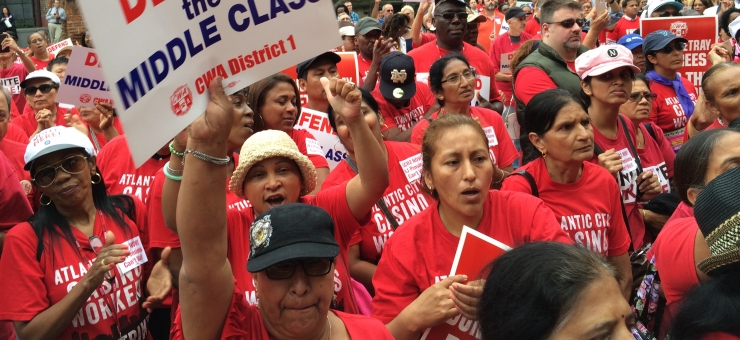New Report Shows How Unions Still Matter for American Workers

In advance of Labour Day in the United States, there’s good news for the American union movement. Despite decades of attacks by corporate interests and their political allies, there is a resurgence of interest in collective bargaining, especially among young people. And U.S. unions are more diverse than ever.
These are key findings from a comprehensive new report by the Economic Policy Institute, How today’s unions help working people. EPI researchers detail how collective bargaining plays an essential role in today’s labour market, by raising workers’ wages in the United States, and supporting a fair and prosperous economy as well as a vibrant democracy.
According to the report, U.S. labor unions are diverse like America itself: members include dental hygienists, graduate students, and digital journalists, as well as manufacturing workers and public-sector employees. About two-thirds of union workers age 18 to 64 are women or people of color. 14.5 percent of black workers age 18 to 64 are covered by a collective bargaining agreement, compared with 12.5 percent of white workers and 10.1 percent of Hispanic workers.
Working people in unions use their collective power to secure a fairer share of the income they create. On average, a U.S. worker covered by a union contract earns 13.2 percent more in wages than a peer with similar education, occupation, and experience in a nonunionized workplace in the same sector. But importantly, collective bargaining also raises wages for nonunion workers—as an economic sector becomes more unionized, nonunion employers pay more to retain qualified workers, and norms of higher pay and better conditions become standard.
However, there is an ongoing attack on workers’ freedom to unite and bargain with their employer. Three-quarters or more of private employers facing organizing drives hire union avoidance consultants to quash the campaign, and a growing number of American states have adopted so-called “Right-to-Work” laws, which seek to defund private sector unions. Additionally, more companies are misclassifying workers to avoid responsibility for the conditions of their employment.
In the face of this, unions have faced an upsurge in popularity—with a favorability of 60 percent in one survey—and given growing inequality and stagnate wages for workers, it is easy to understand why.
“Unions raise workers’ wages and strengthen their rights at work, but they also give working people a voice in our democracy,” said EPI President Lawrence Mishel. “We will never again see consistent robust middle-class wage growth or a healthy democracy without first rebuilding collective bargaining.”
The EPI’s report makes the strong case that to promote an inclusive economy and a robust democracy, the U.S. must rebuild its collective bargaining system.

